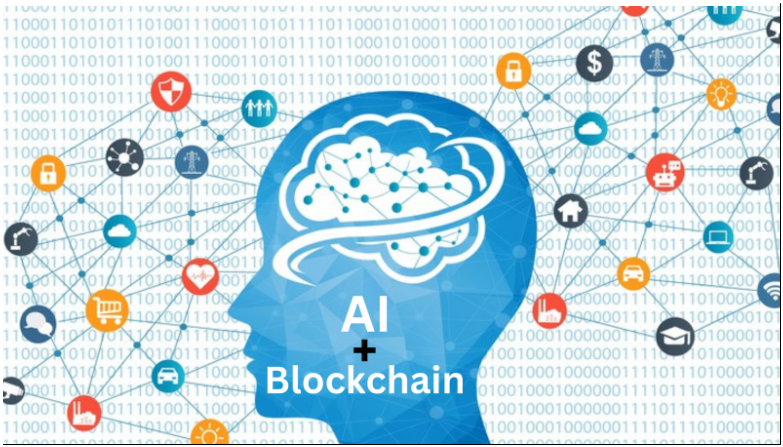BLOCKCHAIN AND ARTIFICIAL INTELLIGENT

Artificial intelligence (AI) and blockchain technology are among the most significant technological advancements of this decade, having a significant influence on a wide range of businesses. Their combination has the potential to unleash much larger possibilities. Although the use of artificial intelligence (AI) in the cryptocurrency industry is still in its early stages, it is demonstrating substantial potential for development. Projections indicate that the market for blockchain AI is expected to reach a valuation of $980 million by the year 2030.
Blockchain technology
This technology is a secure, unchangeable record that allows multiple parties to access and exchange encrypted data during transactions. It can monitor various processes, such as orders, payments, and production, among others. By offering a shared and trustworthy view, it fosters confidence and collaboration among participating members, resulting in improved efficiency and new possibilities for businesses.
Artificial intelligence (AI)
AI utilizes computers, data, and sometimes machinery to replicate human-like problem-solving and decision-making abilities. It includes machine learning and deep learning, where AI algorithms learn from data to enhance predictions and classifications. AI offers advantages such as automating repetitive tasks, enhancing decision-making processes, and delivering superior customer experiences.
Blockchain empowers AI by ensuring data integrity and security, while AI augments blockchain with rapid data analysis and actionable insights. This partnership streamlines business processes, eliminates friction, and enhances efficiency. AI models within smart contracts can recommend product recalls and eco-friendly shipping, strengthening trust and transparency in the data economy.
Combination of Blockchain and AI
Blockchain empowers AI by ensuring data integrity and security, while AI augments blockchain with rapid data analysis and actionable insights. This partnership streamlines business processes, eliminates friction, and enhances efficiency. AI models within smart contracts can recommend product recalls and eco-friendly shipping, strengthening trust and transparency in the data economy.
Blockchain technology vs Artificial intelligent
| Blockchain | Artificial Intelligence (AI) | |
| Core Concept | Decentralized ledger technology that stores and validates data in linked blocks. | Analyzing data, identifying patterns, and using that information to make informed decisions or predictions. |
| Handling of data | Stores data in a distributed ledger where every user (node) holds a copy, ensuring transparency and consensus in a distributed system. | Requires large data for training, analyzes and processes data for insights, and makes predictions based on patterns. |
| Key Functions |
|
|
| Use Cases |
|
|
Latest Trends in Combining Blockchain and AI
Blockchain and AI integration brings powerful tech-trends in the digital landscape. Decentralized AI systems leverage blockchain’s capability to distribute data and computation across multiple nodes, enhancing transparency, security, and trust. The combination also fosters federated learning, where data is locally stored and models are trained locally, preserving data privacy and security. Furthermore, AI-driven smart contracts find a home within blockchain, enabling automated execution based on predefined conditions while maintaining a transparent and secure contract record. These trends mark the evolution of blockchain and AI, offering innovative solutions for various industries and applications.
In the dynamic world of technology, the fusion of blockchain and AI is a game-changer. This powerful combination elevates transparency, security, and data reliability, opening doors to innovation in various sectors. The future looks bright for these technologies, shaping efficient and trustworthy systems in our digital age.